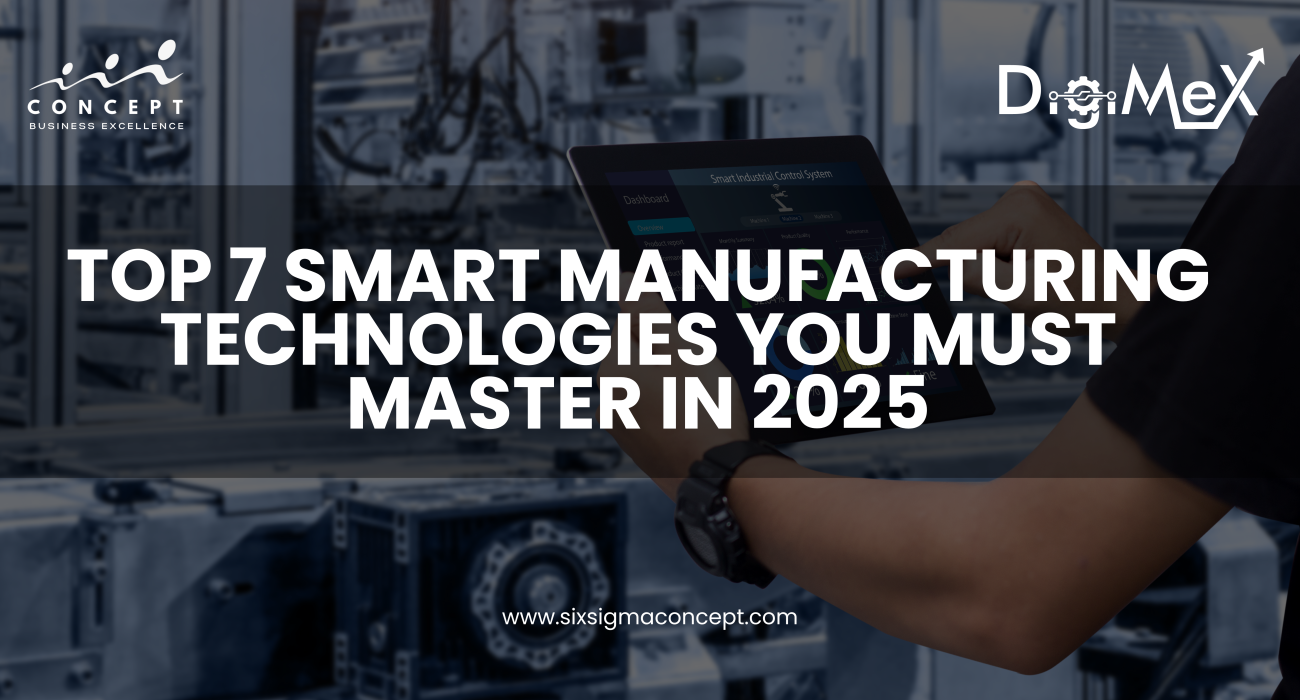As the manufacturing sector faces increasing pressure to reduce costs, enhance productivity, and meet global quality standards, smart manufacturing is emerging as a competitive necessity—not just an innovation trend. By 2025, mastering the right technologies will be critical for operational leaders, engineers, and decision-makers who aim to drive transformation.
Here are the top 7 smart manufacturing technologies that professionals must understand and implement to remain relevant in the evolving Industry 4.0 landscape.
🔹 1. Industrial Internet of Things (IIoT)
Overview:
IIoT refers to the interconnected network of industrial devices that collect, exchange, and analyze data to drive efficiency and productivity.
Key Statistics:
-
According to MarketsandMarkets, the global IIoT market is expected to reach USD 263.4 billion by 2027, growing at a CAGR of 6.4%.
-
McKinsey estimates IIoT could reduce machine downtime by up to 50% through predictive maintenance.
Applications:
-
Real-time condition monitoring
-
Predictive maintenance
-
Energy consumption tracking
🔹 2. Cyber-Physical Systems (CPS)
Overview:
CPS integrates computation, networking, and physical processes. These systems enable virtual modeling of real-time factory operations, facilitating control and automation.
Why It Matters:
-
Digital twins, a form of CPS, can reduce unplanned downtime by up to 30% (Gartner).
-
CPS are essential for intelligent automation and feedback control in smart factories.
Applications:
-
Simulation of production systems
-
Closed-loop control
-
Real-time process optimization
🔹 3. Artificial Intelligence (AI) & Machine Learning (ML)
Overview:
AI/ML are used to process vast amounts of factory data to find patterns, predict outcomes, and recommend actions.
Key Statistics:
-
Deloitte reports that 93% of manufacturers believe AI will be a key driver of competitiveness.
-
IBM estimates AI can reduce supply chain forecasting errors by up to 50%.
Applications:
-
Quality inspection using computer vision
-
Demand forecasting
-
Root cause analysis of process anomalies
🔹 4. Big Data & Advanced Analytics
Overview:
Advanced analytics helps convert raw data from machines, sensors, and systems into actionable business insights.
Why It Matters:
-
According to BCG, data-driven manufacturing firms are 19% more profitable than their peers.
-
Real-time analytics accelerates response times to quality issues and process deviations.
Applications:
-
KPI dashboards and reporting
-
Process optimization
-
Cost reduction initiatives
🔹 5. Additive Manufacturing (3D Printing)
Overview:
Additive manufacturing builds objects layer-by-layer from digital designs, enabling faster prototyping and production flexibility.
Key Statistics:
-
The global additive manufacturing market is projected to reach USD 76.16 billion by 2030 (Allied Market Research).
-
Lead time reduction of up to 90% for prototyping compared to traditional methods.
Applications:
-
Custom tool and jig production
-
Spare parts on demand
-
Lightweight component fabrication
🔹 6. Collaborative Robots (Cobots) & Autonomous Systems
Overview:
Cobots are designed to work safely alongside human operators, while autonomous systems perform repetitive tasks without intervention.
Key Statistics:
-
The cobot market is expected to grow at a CAGR of 32.5%, reaching USD 11.8 billion by 2030 (Fortune Business Insights).
-
Human-robot collaboration can improve productivity by 20–30%.
Applications:
-
Assembly lines
-
Pick-and-place operations
-
Precision handling in hazardous environments
🔹 7. Cloud & Edge Computing in Manufacturing
Overview:
Cloud computing allows centralized data access and scalability, while edge computing enables processing near the source of data generation.
Why It Matters:
-
Accenture notes manufacturers using hybrid cloud and edge computing can reduce latency by up to 70%.
-
Enhances real-time responsiveness and system resilience.
Applications:
-
Smart MES/ERP systems
-
Condition monitoring
-
Remote diagnostics
Conclusion: Be Ready for Smart Manufacturing
The success of modern manufacturing relies on the intelligent adoption of these technologies. As systems become increasingly interconnected and data-driven, professionals must not only understand these technologies but also lead their integration and scaling across operations.
Ready to gain hands-on knowledge and strategic insights?
Join the Certified Smart Manufacturing Professional (CSMP) program on July 5, 2025, and position yourself as a leader in digital transformation.


